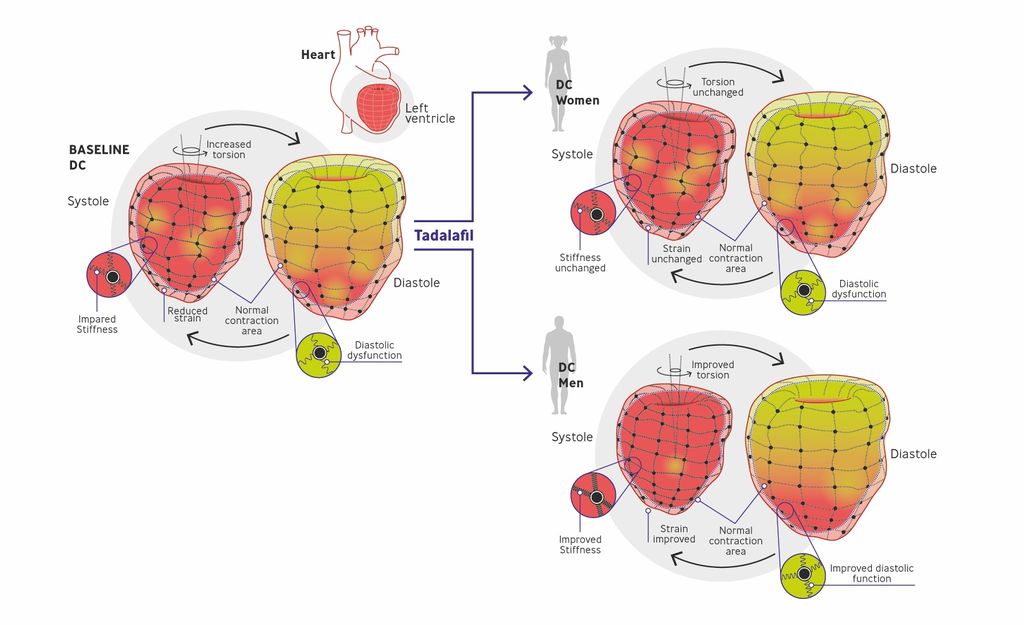
A new treatment option effectively combats cardiac and renal complications of diabetes: beneficial effects differ according to sex
Men and women do not respond equally to drugs. Even though the differences between the two sexes are well recognised in various diseases, for example, cardiovascular diseases, clinical trials have for years neglected this aspect also in terms of study design, involving predominantly male patients.
For the first time, a randomised, placebo-controlled trial was specifically designed to study sex differences in male and female diabetic patients with diabetic cardiomyopathy in their response to tadalafil, a drug initially tested as a vasodilator to combat certain cardiovascular diseases and currently used to combat erectile dysfunction.
It often happens in scientific research that a drug tested against one disease also proves effective against others. That was the case with phosphodiesterase type 5 inhibitors (PDE5i), such as Viagra and Cialis. For this reason, the indication of PDE5i turned to the andrological field, bringing an end to 'commercial' interest in cardiovascular research.
However, the research group, coordinated by Andrea Isidori of the Department of Experimental Medicine at Sapienza University of Rome, highlighted the potential benefits of PDE5i in the treatment of diabetes complications as well, identifying those who could benefit from this class of drugs: men suffering from microvascular problems related to the disease (erectile dysfunction, cardiomyopathy, renal disease) and menopausal women at risk for renal disease, opening up interesting scenarios on the role of oestrogen in mediating the effects of drugs at the cardiac level.
'The efficacy in andrology of PDE5i,' says Andrea Isidori, 'has attracted the medical community's attention to such an extent that their possible use in women has been ignored. We, therefore, insisted on investigating other targets for these drugs. After demonstrating the efficacy of PDE5i on cardiac remodelling in diabetic men, we pooled all the scientific evidence through a meta-analysis and found gender-related differences in the study populations. Subsequently, we discovered that PDE5i could also target the kidneys. Today, with this new work, we have finally demonstrated how the effects of PDE5i are sex- and tissue-specific, revealing the considerable potential of these drugs, especially in the field of precision medicine'.
The study, a collaboration between the Departments of Experimental Medicine, Clinical Internal Medicine, Anaesthesiology and Cardiovascular Sciences, Translational and Precision Medicine, Radiological, Oncological and Anatomo-pathological Sciences of Sapienza University and the IRCCS Neuromed in Pozzilli, the Bio-Medical Campus University of Rome, the Fatebenefratelli Hospital and the University of Cagliari, was published in the journal Science Translational Medicine.
Using a multidimensional approach, which exploited cardiac magnetic resonance imaging, renal vascular imaging, immune profiling and various molecular patterns analysed by digital-PCR, the authors studied each component among the many possible targets of PDE5.
'We are sure,' adds Andrea Isidori, 'that the lack of oestrogen is why women failed to achieve the cardiac improvement observed in men. Pharmaceutical companies should consider that pre-menopausal and post-menopausal women may respond differently to drugs and, therefore, should be adequately represented in clinical trials'.
It is important to emphasise that these results were achieved with negligible side effects, with a very cheap and off-patent drug. In any case, it is always necessary to be prescribed by medical personnel who can monitor the potential adverse effects of this class of drugs and especially the interaction with other drugs taken.
'The prescription of a drug therapy must take into account,' explain first authors Riccardo Pofi and Elisa Giannetta of the Department of Experimental Medicine at Sapienza University, 'sex, menopause, stage of the disease, concomitant drug therapies and, why not, also the cost of the therapy. This research shows that PDE5i are a safe and well-tolerated class of drugs that we should not be afraid of, as well as being inexpensive and with beneficial effects that are as yet underestimated'.
References:
Sex-specific effects of daily tadalafil on diabetic heart kinetics in RECOGITO, a randomized, double-blind, placebo-controlled trial - Riccardo Pofi, Elisa Giannetta, Tiziana Feola, Nicola Galea, Federica Barbagallo, Federica Campolo, Roberto Badagliacca, Biagio Barbano, Federica Ciolina, Giuseppe Defeudis, Tiziana Filardi, Franz Sesti, Marianna Minnetti, Carmine D. Vizza, Patrizio Pasqualetti, Pierluigi Caboni, Iacopo Carbone, Marco Francone, Carlo Catalano, Paolo Pozzilli, Andrea Lenzi, Mary Anna Venneri, Daniele Gianfrilli, Andrea M. Isidori - Science Translational Medicine (2022) http://dx.doi.org/10.2139/ssrn.3745196
Further Information
Andrea Isidori
Dipartimento di Medicina sperimentale
andrea.isidori@uniroma1.it
